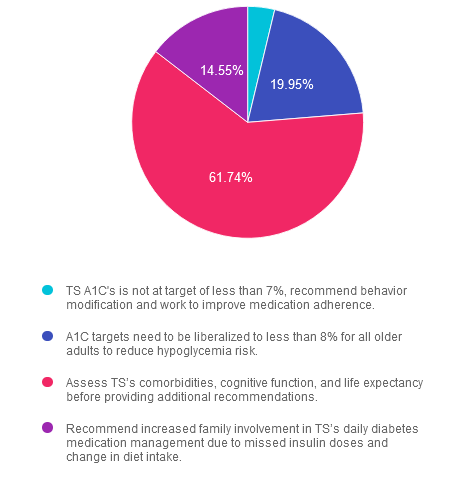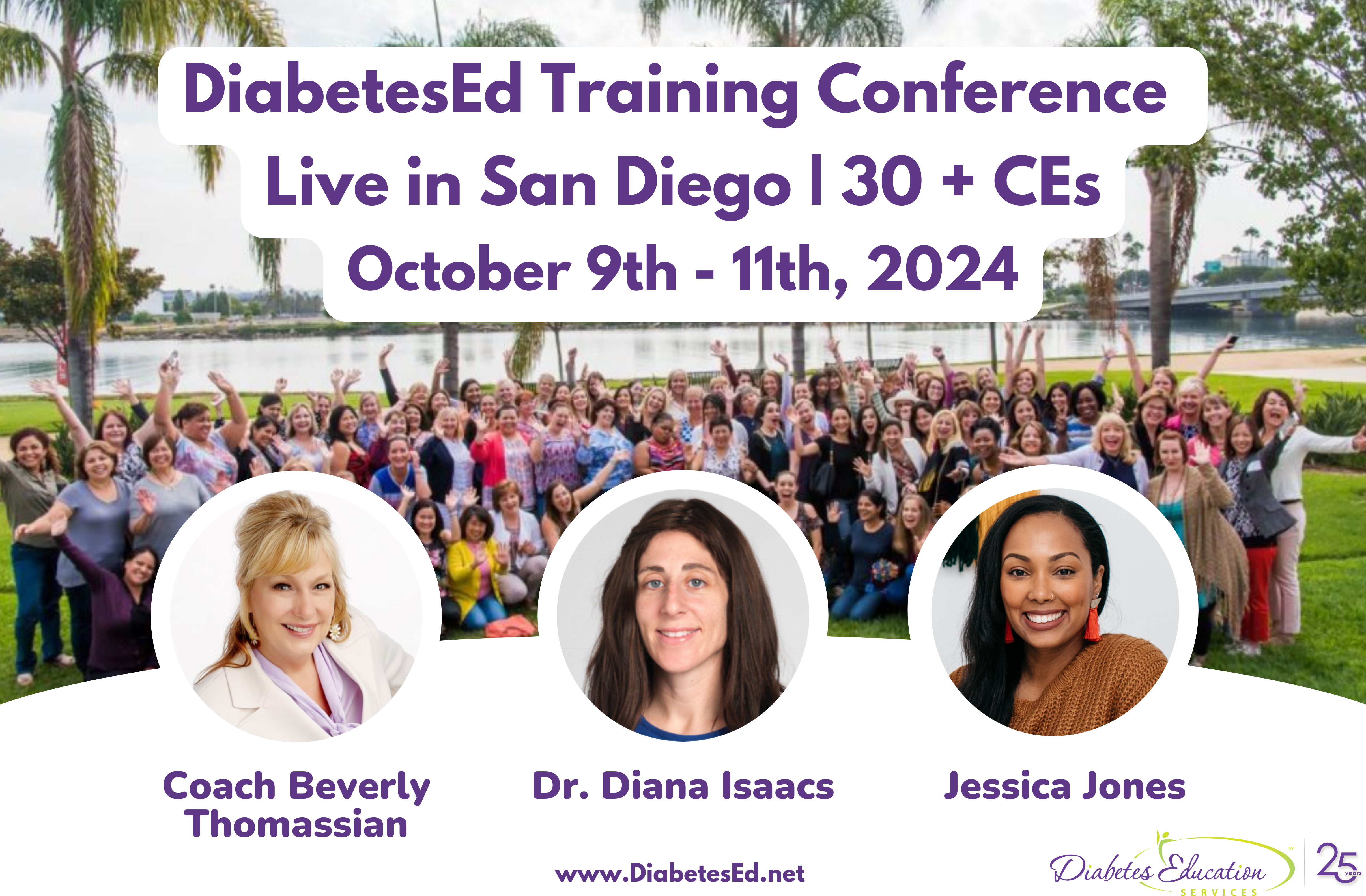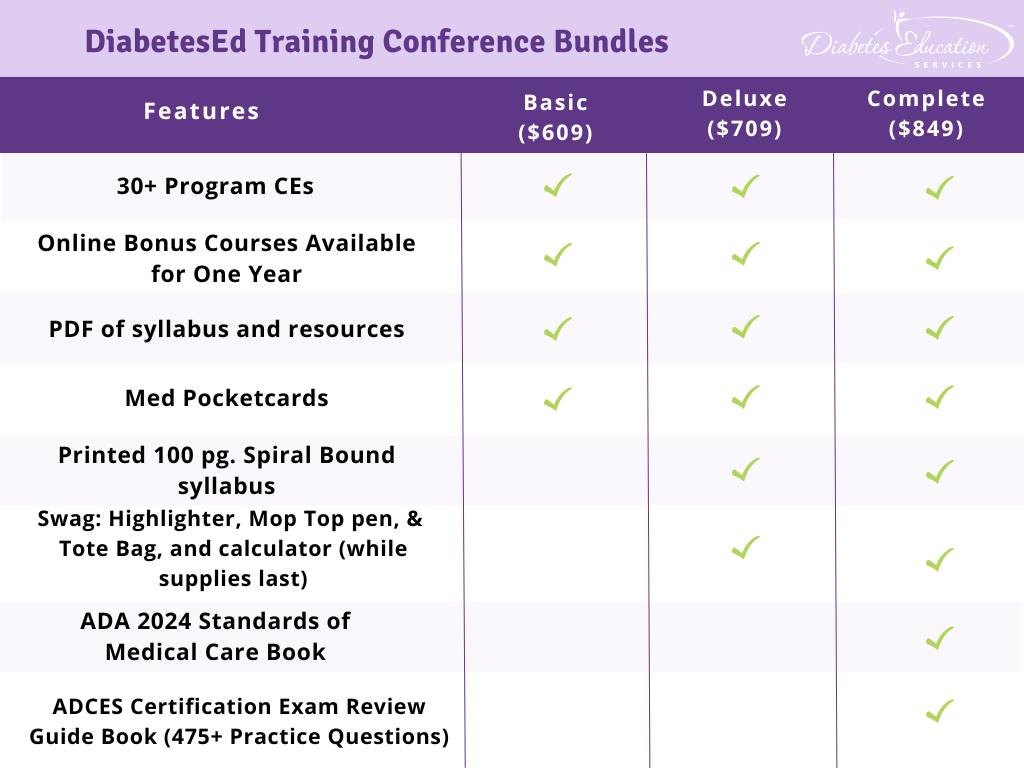For last week’s practice question, we quizzed participants on older adults and goals for care. 62% of respondents chose the best answer. We want to clarify and share this important information, so you can pass it on to people living with diabetes and your colleagues, plus prepare for exam success!
Before we start though, if you don’t want any spoilers and haven’t tried the question yet, you can answer it below: Answer Question

Question: TS is 82 years old, living with type 1 diabetes for the past 56 years. They present to the clinic with their family for diabetes care and education. TS’s last A1c was 7.6%, with a Time in the Range of 64% and Time below the Range of 1%. TS lives alone and self-manages their medications, and the family reports concern of potential missed insulin doses and dietary intake patterns are less consistent over the past few months.
Considering diabetes management in older adults, what recommendations would you give TS and his family?
Answer Choices:
- TS’s A1C is not at target of less than 7%, recommend behavior modifications and work to improve medication adherence.
- A1C targets need to be liberalized to less than 8% for all older adults to reduce hypoglycemia risk.
- Assess TS’s comorbidities, cognitive function, and life expectancy before providing additional recommendations
- Recommend increased family involvement in TS’s daily diabetes medication management due to missed insulin doses and change in diet intake.

Getting to the Best Answer
Answer 1 is incorrect. 3.76% chose this answer. “TS’s A1c is not at target of less than 7%, recommend behavior modifications and work to improve medication adherence.” Answer 1 is incorrect. The American Diabetes Association 2024 Standards of Care recommends personalizing glycemic targets for adults over 65 depending on comorbidities, cognitive and functional status, and living situations. An A1c of less than 7% may not be appropriate.
Answer 2 is incorrect. 19.95% of you chose this answer. “A1c targets should be liberalized to less than 8% for all older adults to reduce hypoglycemia risk.” Answer 2 is incorrect. While it is true we may liberalize A1c targets for older adults to prevent hypoglycemia, it is not the best answer. Older adults over 65 who are otherwise healthy, have stable coexisting chronic conditions, and have intact functional and cognitive status may benefit from lower glycemic goals (less than 7 to less than 7.5%).
Answer 3 is correct. About 61.74% of respondents chose this. “Assess TS’s comorbidities, cognitive function, and life expectancy before providing additional recommendations.” Answer 3 is the correct action. In older adults with diabetes, assessing comorbidities, cognitive function, and life expectancy is important to allow for the personalization of diabetes management recommendations and care goals.
Finally, Answer 4 is incorrect. 14.55% chose this answer. “Recommend increased family involvement in TS’s daily diabetes medication management due to missed insulin doses and change in diet intake.” Answer 4 is incorrect. We need more information to conclude that TS needs additional family support today. Completing a comprehensive evaluation, including cognitive function screening, is essential before providing recommendations.
We hope you appreciate this week’s rationale! Thank you so much for taking the time to answer our Question of the Week and participate in this fun learning activity!
Want to learn more about this question?
Join us Live in Sunny San Diego for our
Annual DiabetesEd Training Conference
October 9th-11th, 2024

Join Coach Beverly and Team for two and a half days of knowledge-sharing, fun, networking, games with prizes, and “aha” moments in beautiful San Diego on October 9-11, 2024.
You don’t want to miss this one-of-a-kind learning opportunity. Get away from all those daily responsibilities and immerse yourself in a fun and intensive conference with plenty of networking opportunities.
Attendees will leave this conference with new tools and a more complete understanding of the latest advances in diabetes care, from medications to technology to Medical Nutrition Therapy!
Each day, we provide a healthy breakfast, including fresh coffee, to kick off your morning. Our instructors co-teach the content to keep things fresh and lively. Plus, we play DiaBingo to reinforce key content and give away prizes. In addition, we provide plenty of movement breaks led by volunteers from the audience. Did we mention delicious lunches and a conference meeting space just minutes from San Diego Bay?
Friend Discount: 3 or more only $559-$799 (based on registration package) per person. Email us at [email protected] with the name and email of each registrant to get the discount!

Time: The course is Wednesday through Friday. Join us for breakfast at 7:00 a.m. each day. The class begins at 8:00 a.m. and ends at 5:00 p.m. on Wednesday and Thursday and at 3:00 p.m. on Friday.
- 3 Days: of critical information delivered by passionate speakers in an engaging and fun format!
- 18+ CEs: earned at the Live Seminar (RDs earn 18.75 CEs while Nurses & CA Pharmacists earn 22.75 CEs)
- 10 Bonus Online Courses, Earn 10+ CEs: As a course attendee, you automatically receive a bonus online course bundle of 13 online courses valued at over $179. Coach Beverly carefully chose each of these courses based on student feedback on which content best helped them succeed at the certification exams and in their clinical practice. You will be given instructions after you purchase the course on how to enroll in our Online University and get started!
- Healthy breakfast all days, gourmet lunch both days and refreshments.
- E-version of the syllabus
Sign up for Diabetes Blog Bytes – we post weekly Blog Bytes that are informative and FREE! Every week we post one exam practice Question of the Week and Rationale of the Week. Sign up below!
Accreditation: Diabetes Education Services is an approved provider by the California Board of Registered Nursing, Provider 12640, and our CPEU courses have received Prior Approval* from the Commission of Dietetic Registration (CDR), Provider DI002. Since our CPEU courses received Prior approval* from the CDR, these CPEU courses satisfy the CE requirements for the CDCES /BC-ADM regardless of your profession!
The use of DES products does not guarantee the successful passage of the certification exam. CBDCE and ADCES do not endorse any preparatory or review materials for the CDCES or BC-ADM exams, except for those published by CBDCE & ADCES.









